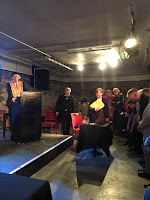The Trial of Thomas D'arcy Mcgee
When: Friday April 12th, 2019. Doors open at 7PM, play begins at 8PM
Where: St. Brigid's Centre for the Arts, Kildare Room. 310 St. Patrick Street, Ottawa, ON K1N 5K4. Cumberland Street entrance.
Where: St. Brigid's Centre for the Arts, Kildare Room. 310 St. Patrick Street, Ottawa, ON K1N 5K4. Cumberland Street entrance.
Admission: $20
The premise is that Thomas D’Arcy McGee (1825 – 1868), Irish rebel and Canadian patriot, is called from the grave to answer, in the Court of History, the charge that he committed treason against Ireland and her people. The prosecutor is John Mitchel (1815 – 1875), an unrepentant physical force republican from both Young Ireland and the Fenians. Sir Charles Gavin Dufy (1816 – 1903), former prime minister of Victoria, defends Thomas D’Arcy McGee against the charge of treason. Both Lawyers have returned from the grave for the occasion.
John A. Macdonald (1815 – 1891), a founding father of the Canadian Confederation and its first prime minister is called as a witness for the prosecution. McGee’s long suffering and loyal wife, Mary Teresa Caffrey (abt. 1830 – 1871) whom he married in 1847 is called as a witness for the defence.
All of the ghosts are aware of what has happened in the world since they entered the grave. The protocol of an earthly court loosely applies. As in previous Russell plays, the audience plays the part of the jury and their decision determines McGee's innocence... or guilt.
Advanced Online tickets can be purchased here: https://www.eventbrite.ca/e/the-trial-of-darcy-mcgee-a-play-by-anthony-russell-tickets-58460755694
Hailing from the town of Newry in county Down, the Newpoint Players will be performing this hilarious and supremely historical courtroom drama for one night only in Ottawa, as they embark on their third Canadian tour.






















